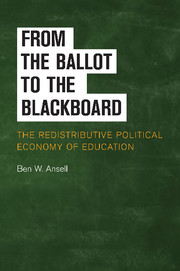Book contents
- Frontmatter
- Contents
- List of Tables
- List of Figures
- Preface
- 1 THE REDISTRIBUTIVE POLITICAL ECONOMY OF EDUCATION
- 2 THE EXPANSION OF EDUCATION TO THE MASSES: THEORY AND DATA
- 3 THE EXPANSION OF EDUCATION: HISTORICAL EVIDENCE
- 4 THE PARTISAN POLITICS OF EDUCATION
- 5 HIGH POLITICS IN HIGHER EDUCATION
- 6 CONCLUSION
- Bibliography
- Index
- Titles in the Series
4 - THE PARTISAN POLITICS OF EDUCATION
Published online by Cambridge University Press: 06 July 2010
- Frontmatter
- Contents
- List of Tables
- List of Figures
- Preface
- 1 THE REDISTRIBUTIVE POLITICAL ECONOMY OF EDUCATION
- 2 THE EXPANSION OF EDUCATION TO THE MASSES: THEORY AND DATA
- 3 THE EXPANSION OF EDUCATION: HISTORICAL EVIDENCE
- 4 THE PARTISAN POLITICS OF EDUCATION
- 5 HIGH POLITICS IN HIGHER EDUCATION
- 6 CONCLUSION
- Bibliography
- Index
- Titles in the Series
Summary
INTRODUCTION
In advanced industrial countries, the politics of education may be more formalized than the struggles between autocratic elites and uneducated masses we saw in the previous chapters, but they are no less consequential. While few politicians actively espouse cuts to education, the harsh realities of budgetary trade-offs mean that the underlying spectrum of partisan preferences over education typically manifests itself in policy outcomes. In fact, even among the world's richest countries, education spending can be extremely volatile, and that volatility hinges on the partisan identity of government. In this chapter, I show that swings in partisanship may have an impact on education spending as large as the effects of democratization that we saw in Chapter 2. Partisanship matters for education and it matters to the tune of billions of dollars.
The idea that partisanship affects policy outcomes is hardly new in political science. Indeed, it would be hard to believe that people would vote as they do if parties entirely failed to represent and execute the policy preferences of their constituencies. Work on this topic in political science has a storied history: from the analyses of Shonfield (1965) and other postwar analysts of comparative economic policy in the “Golden Age,” through the “power resources” analysis of writers such as Korpi (1983) and Esping-Andersen (1985), to the more recent heirs to that literature (Bradley et al., 2003; Garrett, 1998; Rueschemeyer, Stephens, and Stephens, 1992).
- Type
- Chapter
- Information
- From the Ballot to the BlackboardThe Redistributive Political Economy of Education, pp. 119 - 163Publisher: Cambridge University PressPrint publication year: 2010

